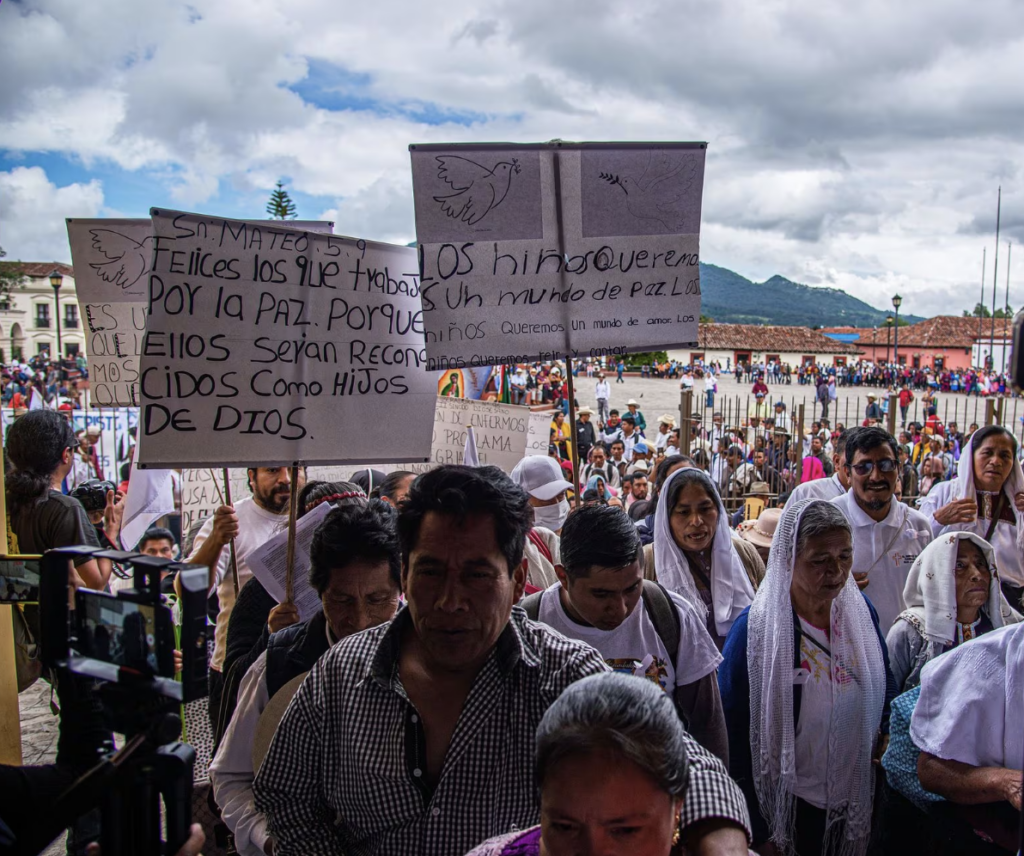
03/08/14 (written by dsánchez) — On Wednesday, February 26, just four days after the arrest of Joaquín “El Chapo” Guzmán Loera, more than 2,000 demonstrators took to the streets of Culiacán, Guamúchil, and Morcorito in the Mexican state of Sinaloa to protest in support of the fallen drug kingpin. The protestors demanded that Guzmán—the former leader of the powerful Sinaloa Cartel thought to be largely based in that state—be freed from prison and that he, under no circumstances, be extradited to the United States, where he also faces drug trafficking charges. The crowds were largely made up of youth, young adults, students, and civilians from El Chapo’s hometown of Badiriguato, which sits outside of Culiacán.
That following Sunday, March 2, a couple hundred demonstrators met again in Culiacán, gathering at the statue of the Saint Jesús Malverde, who is thought to be the protectorate of drug traffickers. Although the protestors were met with a strong police presence, they continued their march from the statue to the city’s downtown. A Culiacán judge reported that more than 200 citizens were arrested along the way and charged with disturbing the peace or similar charges. All arrested participants were released after a 12-holding period. Sinaloan authorities have also faced criticism for stopping the demonstrations and allegedly acting aggressively towards reporters. The Associated Press reports that authorities insisted they did not seek to infringe on the citizens’ freedom of expression or right to gather, but that they “would not tolerate marches that disturbed the peace or provided support or justification for criminals.”
Students in the neighboring state of Durango then organized another pro-Guzmán gathering to be held on Saturday, March 8, led by 20-year-old college student Melissa Montenegro. Shortly after creating the event and seeing over 250 of the more than 1,000 invitees confirm their attendance, Montenegro announced that the gathering would be cancelled due to offensive remarks and threats she received on the event’s Facebook page. Between the threats, her concern over her and her family’s safety, and the overwhelming number of confirmed participants, Montenegro admitted that the event—initially intended to be an afternoon gathering with friends and students in support of El Chapo’s release—“got out of hand.” According to Proceso, she also confirmed that her decision to cancel was not influenced in any way by the Mexican government or police.

The outpouring of support for El Chapo comes from the fact that the cartel leader is an oft-respected figure of the lower income citizens in Sinaloa. Demonstrators at the marches said they felt so strongly about El Chapo’s release because he—the most powerful and most-wanted drug trafficker in the Western Hemisphere—used his status to provide them with jobs, money, and security. Without him, expressed the protestors, not only is there a feeling of insecurity, particularly those in Culiacán and Badiriguato, but there is also concern that his absence will lead to an outbreak of violence as criminal organizations and factions within the Sinaloa Cartel vie to seize El Chapo’s relinquished power and territories. Sinaloans are no strangers to drug cartels; they understand that El Chapo’s arrest has left a power vacuum in the drug trafficking industry. Moreover, they credit him and his cartel with largely keeping civilians safe from kidnappings and violence, unlike other regions of Mexico where such criminal activity is common.
El Chapo’s public support, news reports say, shows that many Mexicans, and in particularly Sinaloans who have lived for years under the rule of the Sinaloa Cartel, share the sentiment that although the conventional outlook on cartels is that of their violence, kidnappings, and strife on communities, the cartels also bring security and jobs to many communities where the government otherwise has failed to do so. Demonstrators took the chance to say that El Chapo is more trusted by the community than any government official.
Meanwhile, government officials, including the Attorney General of Mexico (Procuraduría General de la República, PGR), expressed their frustration and skepticism of the public’s support for a figure that has killed, hurt, and/or negatively affected so many people. “As more than just an attorney, but as a Mexican citizen I am truly frustrated,” said PGR Director Jesús Murillo Karam. “It is not realistic that someone who has presumably killed and injured and affected so many people can be defended as he has been,” he added. According to the Associated Press, some protestors in one of the Culiacán marches were allegedly offered $700 pesos ($53 USD) for joining the demonstrations.
Regardless, there is a growing polarization between those in favor of and those against El Chapo, particularly in Sinaloa. Nevertheless, the pro-El Chapo protests that have occurred thus far have had a far bigger turnout than those against.
Sources:




